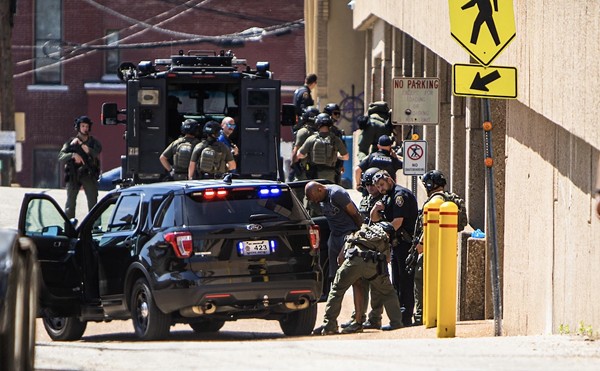But the National Rifle Association (NRA) made me do it.
Actually, it was the NRA's full-page ad in Tuesday's USA Today that unleashed all the godless, communist-sympathizing, Second Amendment-bashing, criminal-coddling demons lurking deep within my evil liberal self. It was just too much.
On a page headlined "SPIKE LEE, ROSIE O'DONNELL AND THE REST OF THIS COUNTRY'S GUN HATERS NEED TO READ THIS," the NRA unveiled its bold new theme: "Be reasonable."
Yes, "be reasonable." That was the message delivered last week by NRA executive vice president Wayne R. LaPierre (in testimony before a House subcommittee) and repeated to the public in the USA Today ad.
The NRA says "be reasonable." It's Jerry Falwell telling us to loosen up and party like rock stars. It's Jerry Springer begging for civility.
By my count, LaPierre used the word "reasonable" on 18 separate occasions to describe NRA positions. He used the word "unreasonable" 16 times with regard to the so-called Lautenberg Bill passed recently by the Senate. He ended his remarks by saying, "I am asking you to practice yourself what is so readily being preached to us: Be reasonable."
LaPierre claimed that "good Americans have been exposed daily to a well-coordinated, systematic bashing of the National Rifle Association's membership as somehow a reckless societal pathogen, a mighty extremist empire opposed to safety, caution and reason. That is a cruel and dangerous lie."
Well, I may not know what a pathogen is, but I understand cruel and dangerous lies. Consider this one from LaPierre, speaking for his mighty extremist empire:
"Nobody -- nor any combination of entities you care to add up -- has invested even a measurable fraction of what we have invested toward keeping safety and sanity central to the lawful exercise of the Second Amendment."
Enough. The NRA may have stayed mostly backstage here in Missouri as the bankroller of the failed Proposition B (the ballot measure to make concealing heat an inalienable right), but if it insists upon making its victimization an issue -- and being "reasonable" its battle cry -- then it's time to take a trip down memory lane.
Here is just a sampling of "reasonable" NRA positions in the past two decades:
* Opposed an early Reagan-administration task-force recommendation in 1981 to require individuals to report the theft or loss of handguns to local authorities.
* Opposed another recommendation by the task force to make handgun buyers wait for background checks.
* Opposed still another recommendation by the task force to ban importation of unassembled handgun parts.
* Opposed a congressional ban on exploding and armor-piercing bullets in 1985, despite the measure's strong support from law-enforcement authorities, only to back off the position after a firestorm of public outrage.
* Opposed a California bill to place limitations of the sale of high-powered assault weapons, proposed in 1985 after Uzi semiautomatics were used in the McDonald's massacre at San Ysidro, Calif. The NRA would later fight similar assault-weapons bans in numerous other states and Congress.
* Opposed a 1986 congressional bill to ban the manufacture, importation or sale of plastic firearms that can't be detected by standard security equipment such as that used in airports.
* Opposed a 1987 Florida bill to provide a 72-hour "cooling-off" period for gun purchases.
* Opposed requiring prospective gun buyers to have identification cards, issued by local authorities after fingerprinting and criminal-background checks, a step urged by law-enforcement officials but killed in 1989 in the Bush administration.
* Opposed a 1990 California bill to require a $17 basic firearms-safety course for handgun purchasers, even though it would have exempted licensed hunters, military veterans and others.
* Opposed a 1991 California bill requiring trigger locks on all newly purchased guns. The NRA vehemently fought the measure, arguing it wouldn't guarantee use of the locks, a position apparently forgotten this week by Mr. Reasonable, who now says trigger locks are "not just reasonable but essential."
* Opposed a 1992 bill, supported by President Bush and law-enforcement officials, to ban 13 military-style assault weapons and magazine clips containing more than seven rounds.
* Opposed, over a period of several years, all proposed versions of the Brady Bill, which mandated a national five-day waiting period for handgun purchases.
* Opposed a 1993 Virginia law banning the purchase of more than one handgun every 30 days.
* Opposed a 1994 California bill making it illegal for any felon to possess ammunition, clips, magazines or other gun paraphernalia. The NRA, despite all its talk about getting tough on criminals, argued that the prohibition should be limited only to felons convicted of violent crimes.
* Opposed, in 1995, the use of research dollars by the Centers for Disease Control (CDC) to study gun violence. The NRA said the CDC study was "a campaign to reduce lawful firearms ownership in America."
* Opposed in 1996 a Clinton plan to put chemical markers, called taggants, in black and smokeless powders to allow law-enforcement authorities to trace the source of an explosive after a bomb goes off.
* Opposed a 1997 Senate bill to prohibit anyone convicted of a misdemeanor offense of domestic violence from possessing or purchasing a firearm.
* Opposed a series of 1997 California gun-control laws, including two designed to limit teenagers' access to guns. The NRA opposed measures increasing the number of people who could be prosecuted for negligently storing a loaded gun and raising to 16 (from 14) the age of those from whom a loaded gun must be kept out of reach.
* Opposed, at least initially, a wide range of proposals spurred by the Columbine High School massacre, including raising the age for handgun ownership to 21 (from 18) and requiring background checks for purchases at gun shows.
Are these the positions of a "reasonable" organization, or one that would likely defend armored-tank ownership as a Second Amendment right?
Judge for yourself.
And be reasonable.





